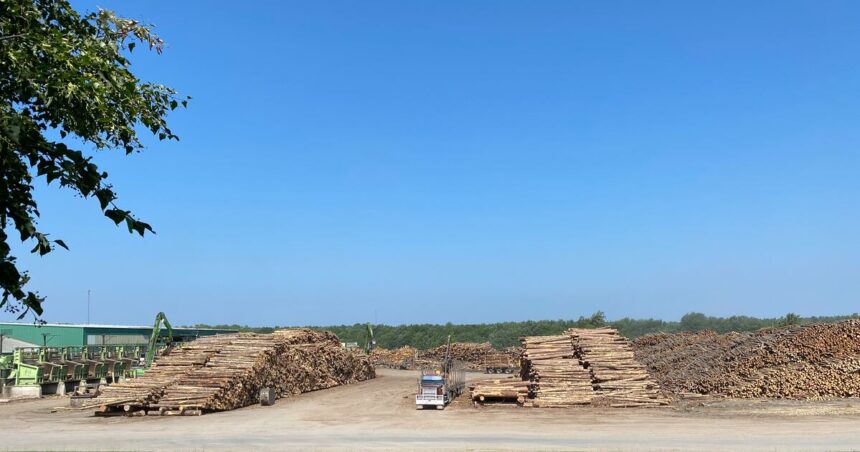Yesterday afternoon, I stood at the edge of the St. Croix River watching as workers loaded specialized paper products onto a freight truck bound for Michigan. The scene was routine for St. Stephen, New Brunswick—a border town where roughly 80 percent of the local economy depends on cross-border trade with the United States. But conversations with locals revealed a growing unease about what might happen if Donald Trump returns to the White House.
“It’s not just business for us—it’s life,” says Marie Doucette, who has worked at the town’s pulp and paper mill for 22 years. “When Trump first started with the tariffs in 2018, we felt it. Our overtime disappeared, and everyone got nervous.”
That anxiety has returned as Trump campaigns on promises of sweeping new tariffs that could reach 60 percent on Canadian goods. For communities like St. Stephen—population 4,400—where manufacturing jobs and cross-border commerce form the backbone of local existence, the threat feels existential.
The J.D. Irving paper mill, which employs nearly 300 people in St. Stephen, survived the previous round of Trump-era tariffs, but not without damage. According to data from Statistics Canada, New Brunswick’s paper exports to the U.S. dropped 14 percent during the 2018-2020 period, representing almost $68 million in lost revenue.
Robert Williams, an economist at the University of New Brunswick, explains that border communities face unique vulnerabilities. “These aren’t just economic relationships—they’re integrated ecosystems,” Williams told me at his Fredericton office. “When you have three generations of families whose livelihoods depend on cross-border trade, policy shifts don’t just affect balance sheets; they affect community stability.”
The Canadian government has begun preparing for potential new trade disruptions. Last month, Deputy Prime Minister Chrystia Freeland met with provincial trade ministers to discuss contingency plans, acknowledging the particular vulnerability of Atlantic Canada’s resource sectors.
“We survived the softwood lumber disputes and the first Trump administration’s aluminum tariffs,” says David McKay, St. Stephen’s mayor. “But another round of this, especially at the levels being discussed? I don’t know if we bounce back so easily.”
McKay’s concerns extend beyond the paper mill. The town’s small manufacturing businesses, many supplying components to American automotive or aerospace companies, operate on thin margins that can’t absorb significant tariff costs.
At Johnson’s Hardware, a 108-year-old family business on Water Street, owner Thomas Johnson shows me his inventory management system. “See this? I’ve started tagging everything based on country of origin. Canadian-made products in one category, American in another. I’m preparing to shift my purchasing if I need to, but the truth is, some items just don’t have domestic alternatives.”
The potential impact reaches beyond businesses directly engaged in export. The Ganong chocolate factory—Canada’s oldest candy company and a local institution—relies on American tourists who cross the border to visit its chocolate museum and factory store.
“During COVID border closures, we lost about 40 percent of our retail visitors,” explains Briana Martin, the company’s tourism manager. “Any policy that makes crossing the border more complicated or expensive hurts us immediately.”
Canada’s International Trade Minister Mary Ng has emphasized that the existing USMCA trade agreement provides some protection against arbitrary tariffs. However, former American trade negotiator David Jacobson told CBC News last week that determined administrations can find ways to circumvent trade deal provisions through national security exemptions.
During my visit, I attended a community meeting at the town library where residents discussed forming a cross-border advocacy coalition with their American neighbors in Calais, Maine—just across the river. The initiative reflects a growing recognition that economic destinies on both sides of the border are intertwined.
“We share workers, customers, even family members,” says Patrick LeBlanc, who operates businesses on both sides of the border. “Many Americans don’t realize that hurting Canadian businesses ultimately hurts them too. When our payrolls shrink, we’re not crossing over to shop in Calais.”
Data from the Bank of Canada suggests that every 10 percent increase in tariffs on Canadian exports could reduce national GDP by up to 1.3 percent. For border communities like St. Stephen, where alternative markets aren’t readily accessible, the impact would be considerably higher.
“It’s geography and history,” says Williams. “These communities developed around cross-border trade flows that predate modern borders. Asking them to suddenly pivot to new markets is like asking them to move the town itself.”
As evening fell on St. Stephen, I watched workers change shifts at the paper mill. Many headed directly to the international bridge, returning to homes on the American side. Others gathered at the Border Town Pub, where conversation inevitably turned to politics.
“We weathered it before, we’ll weather it again,” said one mill worker, Mike Thompson, with determined optimism. “But I wish politicians understood what their trade wars do to regular people just trying to make a living.”
As I prepared to leave town the following morning, Mayor McKay offered a parting thought: “Whatever happens with tariffs, we’ll find a way forward. But it would be nice if, just once, border communities weren’t the first casualties of international posturing.”
The St. Croix River continued flowing beneath the international bridge, indifferent to the human-drawn line cutting through its waters—a reminder that while borders may be political constructions, their consequences are profoundly real for the communities caught between competing national interests.






